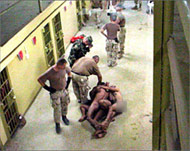Bush Iraq plan offers ‘nothing new’
Hoping to stave off severe criticism of his administration’s failing policies in Iraq, US President George Bush delivered his five steps to constructing a democratic Iraq to a prime-time US audience.

In a half-hour speech to members of the military at the US Army War College in Pennsylvania, Bush outlined his five-step plan for ceding control of Iraqi sovereignty to an interim Iraqi government in line with UN envoy al-Akhdar al-Ibrahimi’s suggestions and advice.
The steps begin with the 30 June transfer of sovereignty and lead up to a referendum on an Iraqi constitution in 2005.
The new Iraqi interim government is expected to have 26 ministers headed by two vice-presidents and “the new president of Iraq”.
However, it remained unclear whether the new president and vice-presidents would be nationally elected or appointed.
Bush also stressed the US “would commit our current troop level at 138,000 as long as necessary. If they [US military commanders] need more troops, I will send them.”
New beginning
In his opening statements, Bush described the decapitation of independent civilian contractor Nicholas Berg as “a contempt for all the rules of warfare”.
 |
|
The Washington Post pictures |
He also briefly touched upon the ongoing graphic revelations of abuse and torture of Iraqi prisoners at Abu Ghraib and other US-run detention facilities around the country by calling such actions the “disgraceful conduct by a few American troops who dishonoured our country”.
He did not, however, elaborate on the ongoing investigations of prisoner abuse in Iraq.
He outlined plans to demolish the Abu Ghraib prison and relocate current detainees to a new facility yet to be built, which he called “a fitting symbol of Iraq’s new beginning”.
Speech nothing new
However, Judith Kipper, director of the Middle East Forum at the Council on Foreign Relations believes Bush’s speech “was an organised review but there wasn’t anything new”.
Kipper does not believe the prime-time address will help boost the president’s approval rating.
“American people make choices on actions not words. No single speech is going to determine US public opinion. If things improve in Iraq and the handover of sovereignty is peaceful, we can address the poll question at that time,” she told Aljazeera.net.
When asked what the speech lacked, Kipper said: “Acknowledge more the problems the US has encountered in Iraq, the prison scandal, and the suffering of the Iraqi people”.
No accountability
If viewers and Iraq watchers were looking for some kind of accountability in the president’s speech, they were bitterly disappointed.
“There was no mentioning of the abuse of prisoners, he did not talk about accountability,” Nihad Awad, Director of the Council on American Islamic Relations (CAIR), told Aljazeera.net.
Awad was particularly disturbed by what he called “the policies of dehumanising Islam conducted by the jailers”, in reference to Iraqi prisoners abused and tortured by US soldiers.
He was refering to a 16 May Washington Post article which mentions the “Allah factor” – stripping the detainee of faith in God and replacing it with faith in divulging information “as the only hope in life”.
Short on substance
Although Bush’s speech outlined the “difficulties ahead” and that “the way forward may sometimes appear chaotic”, it may have lacked the details required to convince US and world public opinion that the Bush administration’s policies in Iraq have not faltered.
“The speech was short on reality on the ground,” Kipper said.
Awad believes the speech was to be expected, given the lack of security in Iraq, apparent failure of Iraq policy, the scandal of the prison abuse and the blows to the credibility and the popularity of the president in the US.
 |
|
The speech did not address the |
“He needed to make this speech, but he didn’t offer details.”
Awad explained while the US president spoke of international assistance in reconstructing and securing Iraq, he did not offer details on who would offer assistance and by how much in financial, logistical, and on-the-ground support.
“He spoke about reliance on the UN, but how will the UN get involved in Iraq when this administration has worked for a year and a half to undermine and weaken it?” Awad asks.
Former US Secretary of State Madeleine Albright agrees. She told CNN the five points addressed by President Bush raised many questions.
“There are many, many questions and I don’t think there was anything particularly new,” she told the news network, explaining Bush did little to assure the public that Iraqis would support the new Iraqi interim government.
Low poll numbers
With a 23 May CNN/USA Today/Gallup poll pitting Bush’s approval rating at 47% (and 49% disapproval), the White House is hoping Monday’s speech – the first of many – will reverberate positively with disgruntled Republican leaders who have started to voice their dismay at the inept management of the Iraq situation.
|
President George Bush’s five-point plan:
|
Senate Foreign Relations chairman Richard Lugar told a Tufts University graduating class on Saturday he now had doubts the administration knew what it was doing in Iraq.
On Monday, former Centcom chief, Marine General Anthony Zinni, told CBS’ 60 Minutes that “The course is headed over Niagara Falls. I think it’s time to change course a little bit or at least hold somebody responsible for putting you on this course. Because it’s been a failure.”
US-British draft
Also on Monday, a US-British-sponsored UN draft resolution delivered a blow to Iraqi hopes of full sovereignty when it gave
a US-led multinational force powers to apply “all necessary measures” concerning security matters in the country.
The multinational force’s mandate would be reviewed on 30 June 2005, but it remains unclear whether the force would be
required to exit Iraq by that date.
Iraqis would be given nominal control of the oil and gas industry, but may not award contracts, according to the draft.